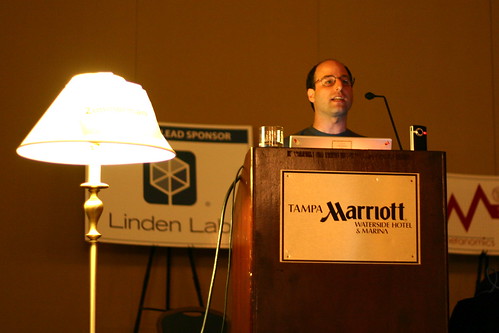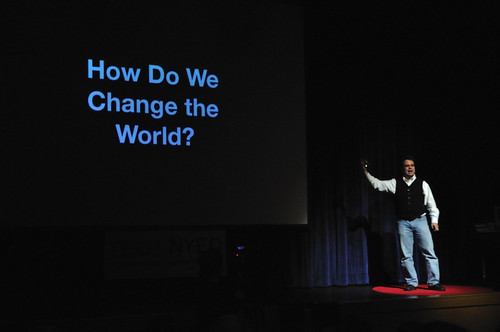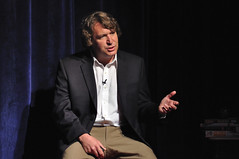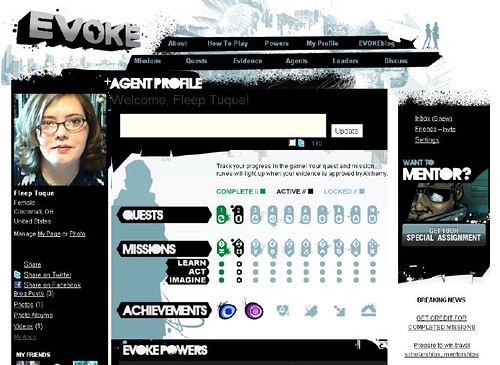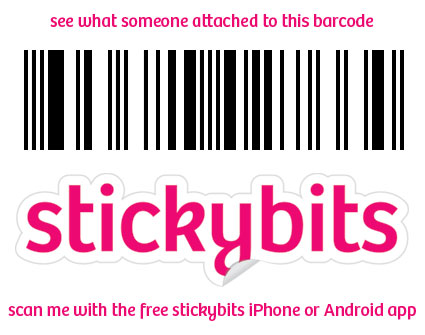About to enter Citi Field stadium, at the front of the line chatting with some awesome fans.
I try to talk about my introvert nature at work a lot, especially with the students on my team, because if they are also struggling with it, I want them to know it isn’t a curse. I like to say that I’m an introvert who has learned to fake it because people sometimes don’t believe me, but it’s true. Some people are energized by social interactions, but for me, anything more than a one-on-one conversation can be draining, and the larger the group, the faster my battery runs out.  If I don’t get periods of solitude to recharge, it can be so exhausting that I get physically sick.
This basic fact about my personality has caused me so much angst and unhappiness. Especially because I also paradoxically feel the need to make useful contributions, whatever the conversation or interaction may be, so there is forever a battle going on with part of me wanting to conserve energy and stay on the side, and part of me wanting to be in the center of the room participating in what’s happening. It has taken a very long time to find a good balance.
I mention my introversion by way of introduction to this third and last post in my #BTSxCitifield series (read Part 1 and Part 2 here) for two reasons.
First and most obviously because the theme of BTS’s Love Yourself: World Tour is about learning to love yourself, and learning to love my introversion instead of hating it has been one of the hardest things for me to do. It was only after I stopped fighting it and gave myself permission to be that way that I learned how to balance my life’s social flow in a way that feels sustainable and good. Ten years ago, flying to New York City and attending a stadium-sized concert like #BTSxCitifield by myself would have been unthinkable. That I was able to not only go to the concert, but truly enjoy the experience – in part because of the huge crowd – is a personal triumph that seems worth celebrating.
Enjoying the show with 40,000 (!!) other fans.
And second, because I am such an introvert myself, I’ve often wondered how the artists, creators, and professionals I admire deal with the pressure of fame and the sometimes crazy emotional demands of their fans. Fame is such a double-edged sword. Attracting passionate fans is a source of success, but losing anonymity, especially today when everyone everywhere has a camera in their pocket, seems to mean losing the ability to just be in the world.
And when does being a passionate fan tip over into being a crazy fan?Â
Is it “crazy fan” territory to buy tickets this expensive?
It may be weird to worry about what it means to be a “good fan” but I think Stephen King’s novel Misery must have made a big impression on me when I was young because I’ve always thought the most respectful way to honor an artist is to support their work from afar. Pay for their work and share/evangelize their stuff to others, but don’t bug them. [1]. There is a natural desire to express appreciation and gratitude when someone’s work has made a positive and meaningful difference in your life, but that should never come at the expense of respecting the boundaries of the real person behind the fame.
I thought about that a lot when BTS released a series of provocative concept photos for their S version of the Love Yourself: Answer album.  It turns out there’s a Korean word specifically to describe obsessive, stalker fan behavior, 사ìƒíŒ¬ or saseang fan [2], and they have obviously experienced that.
What a beautiful but desperate representation of the flip side of fame. They all look so contorted to avoid the constant cameras, prying eyes, and clutching hands. Yikes. @BTS_twt pic.twitter.com/Yv21ZcK9CN
— Chris M. Collins (@fleep) August 13, 2018
It makes you wonder how they are really doing. Not their stage personas, but the real 20-something year old guys behind the scene (see what I did there?). Is this insane hype-train of record breaking achievements actually good for them? Are they being exploited? How are they handling the intense glare of the spotlight, and is my participation in ARMY fan culture hurting or helping them? The introvert me would have withered and died from that kind of intense pressure in my 20s, as so many of my favorite childhood actors actually did die.
River Phoenix and Corey Haim, two of my earliest fan-crushes.
I want to hope that the real people in BTS are doing ok, that they have each other and their families, and that they are still young and resilient enough to enjoy the wild ride that they are on. I have to hope they, and the people who love them, will know when to get off the crazy train when (if?) the time comes.
In my last post, I described how my interest in BTS began and deepened enough to call myself an ARMYÂ and there was a moment, a series of moments, before I clicked the buttons that sucked a ridiculous amount of money out of my bank account, when I wondered if it was crazy-fan territory to sit for an hour in a virtual queue to buy expensive concert tickets, and an expensive plane ticket, and an expensive hotel reservation, just to see a bunch of 20-something boys from Korea for just a couple of hours.
Sitting in a ridiculous virtual line to buy tickets, only to be unceremoniously dumped out to this error message.
Ultimately, I decided that I enjoyed their music and appreciated their art so much that I wanted to be counted among their fans for their first stadium-sized concert and their last show in the US. It wasn’t just about attending the concert, although I was of course excited to see them perform live, but symbolically, I think every fan who came to Citi Field was there to show them and the world just how much their work inspires us. We wanted to give them another win, another trophy for their bag. That super-fun feeling of winning together, ARMY+BTS synergy, is what tipped the scales enough for me to actually purchase the tickets. [3]
The Night Before the Show
I flew out of Cincinnati on the Friday evening before the concert, with just enough time to land at LaGuardia and get settled into the hotel for a good night’s sleep before the show. Hilariously, the first ARMY I met in the wild once I got to New York was another person from Cincinnati! Queue that old joke about flying a thousand miles to meet your neighbor. Our hotels were in opposite directions so we split up shortly after meeting, but we followed each other on Twitter and re-connected after we got home – and now we’re set to watch Burn the Stage together when it comes out in a couple weeks!
Flew all the way to New York to meet another Army from my own backyard! @Chante_tmc2016 Hope you made it to your hotel safely!
#btsincitifield #BTS @BTS_twt pic.twitter.com/mGVu0ZrAfJ
— Chris M. Collins (@fleep) October 6, 2018
That chance encounter with a friendly ARMY was the first of many happy meetings. I saw groups of ARMYs everywhere I went as BTS fans descended on New York from all over the US, and really all over the world. It’s hard to describe the feeling of meeting strangers who don’t quite feel like strangers because you already share a common interest, the instant smiles when we recognized each other, the excitement that everyone felt about arriving for the show.  I really didn’t know what to expect the next day, and after agonizing over what to stuff in my no-larger than 16 inches backpack to comply with the venue rules [4], I managed to sleep like a rock.
And more Armys at the hotel – they drove all the way up from Alabama! #BTSinCitifield #BTS @bts_twt pic.twitter.com/GGNJ4Z5whq
— Chris M. Collins (@fleep) October 6, 2018
Arriving at Citi Field Stadium
I had no idea what it would be like at the venue, so I didn’t really have a plan, but part of the reason I made the trip was to experience the ARMY fan culture, so I took a cab from the hotel around 6:30 AM and got dropped off right at the stadium.
The first picture I snapped after arriving at Citi Field, ~6:45 AM.
The first thing I noticed as I walked across the parking lot was the merch line (the line to buy official merchandise from the band like the t-shirts, bags, etc.), and it didn’t seem crazy long yet, so without even looking around at anything else, I headed for the back of the line.
That big group of people on the right side is the merch line, which hadn’t started moving yet, ~ 6:45 AM.
At that moment, as I approached the back of the merch line barriers, I felt .. nervous. I’d met a couple of fans at the airport and at the hotel, who were all super nice and friendly, but I wasn’t sure what it would be like in the REAL ARMY crowd. Would there be crazy sasaengs? Would it be weird that I was by myself? Was I even a big enough fan to deserve to be there when so many fans couldn’t get tickets? My introvert nature and all the anxiety that comes with it suddenly popped out and I felt.. shy.
I needn’t have worried. I got in line and spent the next couple hours chatting with the fans around me, gawking at all the hand-made signs, watching the merch line grow and grow and grow..
We made it to the merch line! With NYC armys who are awesome. @june800604 @allisonmarie797 #bts #BTSxCitiField pic.twitter.com/Imj6wcuXOB
— Chris M. Collins (@fleep) October 6, 2018
ARMYs behind me in the merch line..
Can you tell how diverse the crowd is? Young, old, men, women, every ethnicity..Â
JOON FOR PRESIDENT!
It turned out that the whole day before the show was a series of waiting in one line or another, and universally, the crowd was friendly and cheerful and happy to chat about BTS endlessly. It was terrific!
The merch line is about to move, opens at 9! #BTS #BTSxCitiField pic.twitter.com/FZ756p5kGd
— Chris M. Collins (@fleep) October 6, 2018
Entering the BTS Village
The “Village” is what they called the cordoned off area where you could buy the “merch” and visit a bunch of different booths to pair your bluetooth-enabled light stick, take a picture with a hologram of your favorite BTS member, donate to their UNICEF LOVE YOURSELF campaign, etc.
Once the merch line started to move when they opened the Village, everyone ran in to.. get in yet another line for whichever specific area or booth you wanted to visit. I stuck with the merch line, and got handed an order form to fill out while waiting with a new group of ARMYs.
In merch line with @LostAngelKazuko #BTS #BTSxCitiField pic.twitter.com/we3GkOmDi7
— Chris M. Collins (@fleep) October 6, 2018
I can’t remember how long we stood in that line, but it seemed to move pretty quickly. I was super disappointed that the official concert t-shirts sold out within the first 15 minutes, since that was the main thing I wanted to get, but there were plenty of other (way overpriced!) things to buy to commemorate the experience.
An example of available merch and the crazy prices. There were like 6 or 7 pages of things you could buy.
Talking about it with the other ARMYs around me, I was surprised to find that everyone hated the new Americanized “Beyond the Scene” branding and didn’t want any of the t-shirts if it didn’t have the original Korean 방탄소년단 (Romanized as Bangtan Sonyeondan) wording. Not that Big Hit Entertainment asked for my opinion, but I think the sincerity and authenticity of BTS is one of their biggest selling points even with American fans, so I’m not sure the “Beyond the Scene” re-brand is gaining traction.
I ended up with t-shirt version 1. No one around me wanted to buy version 2 because it said “Beyond the Scene”. The lady behind me reeeeealllly wanted a hoodie and was afraid they would sell out before she got to the counter. I think she was successful in her quest but I’m not sure, I lost track of her in the crowd.
With my merch in hand and my wallet further emptied, I wandered around for a bit trying to decide which booth to visit. Suddenly I remembered that I had won an express “skip the line” ticket from Big Hit to visit the “BTS Studio” booth where you could take a picture of yourself with a hologram of your favorite member, so I headed over in that direction.. and got in the express ticket line. (Which was only like 10 people long, but still, another line! lol)
The BTS Studio line is pretty chill
#BTSStudiobyLG #BTS pic.twitter.com/lKq2DONFED
— Chris M. Collins (@fleep) October 6, 2018
The Korean tour staff were all very nice and seemed super amused at the Americans saying ê°ì‚¬í•©ë‹ˆë‹¤ (kamsahamnida – thank you).
While I was waiting to get my picture taken, I noticed an ARMY who had just come from the merch line struggling to juggle all of her purchases. Because the “shopping bag” merch item was the cheapest thing on the menu at $5, I bought 3 of them, which was the maximum allowed, so I stepped over and asked her if she wanted a bag to hold all of her stuff. I was glad to have an extra to share! We snapped a picture together once she got her stuff all sorted out.
Have fun @Angel_Shiana !
@heyheybaebae1 #BTS #BTSxCitiField pic.twitter.com/CgPylxdU5D
— Chris M. Collins (@fleep) October 6, 2018
Then suddenly it was my turn to enter the little BTS Studio tent! I have to say, the “hologram” technology they used to make it seem like your favorite BTS member is walking up and sitting down with you to take a picture was pretty freaking cool. I was so flustered trying to sort out my bags and all the stuff I was carrying that I didn’t get a video of that (that’s one time when I really wished I hadn’t come alone), but it was fun all the same and sort of made your heart beat a little faster even knowing it wasn’t real. I also had a little panic trying to pick which member because at this point, I really do love them all (OT7!), but my original favorite won in the end.
Quick, pick your favorite BTS member!
A picture snapped with my phone of the slightly blurry picture I got in the BTS Studio booth. Me and Jimin!
After that I wondered around the Village a lot taking pictures and videos and just enjoying the scene and the freedom of not being in a line for the first time since I arrived.
Fans dancing in the Village..
Another dancing fan… You can see the merch booths in the background.
Tour staff would watch your bags and take a picture of you with your phone at the various sign boards and photo backdrops..
Making a donation to the UNICEF #BTSLoveMyself campaign to end violence against children..
I’m not sure what time it was, but by that point, my feet were starting to hurt a little and I was ready to take a rest. See my note below about the awesomeness of the Trekology YIZI Go Portable Camping Chair – which I promptly pulled out and set up to rest my weary bones and have a drink and a snack.
Having a rest and filming people entering the Village area..
I thought it was pretty irresponsible of the lady yelling at people to run to the lightstick tent because they were selling out, they didn’t sell out the whole day as far as I know.
Lots of people started to sit down and eat things they had brought at that point.
There seemed to be no food or drink vendors anywhere, which I thought was nuts.
A short video I intended to send to my sister but for some reason it wouldn’t upload so I never sent it..
Finding my Gate and Observing the Front of the Hard Core “General Admissions” Line
Shortly after filming that clip, I left the Village area thinking I should at least figure out what gate I would be entering and where the line (surely there was another line!) would be for that. I didn’t realize it at the time, but it turned out that the private box seat ticket holders would be using a gate in the same vicinity as where they were letting the General Admissions line form up to actually enter the stadium.
Now keep in mind that some of the General Admissions folks had been camping out for over a week to get closest to the stage, so as I approached them, I had a feeling like the General Admissions line were the “real” ARMY and the rest of us were just baby ARMYs. We still had hours to go before the show started, so I set up my awesome little camping chair again and watched all the hoopla at the front of the GA line.
The front of the GA line and soundcheck Idol starts playing in the background! #BTS #BTSxCitiField pic.twitter.com/ChgiSGktLF
— Chris M. Collins (@fleep) October 6, 2018
GA line is moving in up to #375. #BTS #BTSxCitiField pic.twitter.com/2GtJEy5rx1
— Chris M. Collins (@fleep) October 6, 2018
Periodically you would see fans who had stepped out of line to get merch or something come running up frantically worried that they had missed their spot, so I started posting short video clips and tweeting them out in the hopes that it would help keep things calm. There were definitely a couple of moments there where it seemed like the crowd might get shovey and pushy, but for the most part, it stayed orderly and calm. After watching them deal with one situation after another, I thought the security staff did a great job of being kind yet firm to keep everyone safe.
For folks in the GA line pink wristbands only and make sure you get in line or they won’t let the gate open. #BTS #BTSxCitiField pic.twitter.com/7ImxGJshBM
— Chris M. Collins (@fleep) October 6, 2018
Somewhere in the midst of the GA line drama, I started to feel really hungry and decided to go off in search of food. I walked and walked and walked and finally came upon what may have been the only food cart out there, a Nathan’s Hot Dog cart. I hate hot dogs, but boy if you’re hungry enough, even a hot dog can taste delicious. In fact, I had two! The Twitter timestamp says I posted this at 3:04 PM, and the stadium opened at 4, so this was shortly before they let us go in to get our seats!
Waiting for food with @viv_zuyez and @edwardf_t_s from Georgia! #BTS #BTSxCitifield pic.twitter.com/S4NIkUetLM
— Chris M. Collins (@fleep) October 6, 2018
Entering the Stadium!
Phew, I feel like I’ve been writing this blog post for eons, and we’re just now getting into the stadium! Picking up from the last section, once they let all the GA folks through, they finally called for our gate and I managed to be like the 10th person in line for that. It was definitely a very buzzy excited feeling getting ready to go into the venue. After months and weeks of planning and then waiting in lines all day, everyone was ready to get inside.
In line with @buihelen01 @erikacruzers @Paulaluvs1D @loveusj have fun ladies! #BTS #BTSxCitiField pic.twitter.com/6PrhwsvWZ0
— Chris M. Collins (@fleep) October 6, 2018
Of course there was one more line to go after they opened the big fence – the security line. I apparently didn’t take any pictures during that period, but they had big K-9 dogs, and a seriously armed police presence at the concert. We saw groups of officers in full riot gear, and some with what looked like long range rifles. It was pretty intense, but given the death threats against members of the band and all the recent public shootings, everyone in line with me agreed that we’d rather have more security than less.
The security check was pretty intense, too. They really did search every single compartment of every single bag I had. I can’t remember if they physically patted us down, but I did have to remove my jacket and sweatshirt and fanny pack, and they definitely wanded us in addition to going through metal detectors. It felt as thorough as any airport screening I’ve been through recently.
And then suddenly we were inside! I must have gotten so excited to actually get to our seats that I forgot I had a camera for a while, because I have no photos of the super posh Porche suite at all.
GA folks getting in place around the stage, before the music videos started.
I did take a few snaps of the GA folks still streaming in around the stage though, and shortly after that they started playing BTS videos on the big screens. The screaming and cheering began in earnest at that point, and it didn’t stop until the show was over. It was sooo loud, you really can’t imagine it.
Somewhere around here, I started streaming live on Periscope, with the intention of streaming the whole show if I could. I know it’s against the rules, illegal, etc. etc. but.. well, there are a lot of people who really can’t afford the crazy expense of attending a live BTS concert. As concerts go, it is one of the most expensive shows on the planet. Seriously, Billboard says it was the most expensive tour of 2018, and that’s just for the tickets. That doesn’t event count the cost of travel, hotel, food, and the aforementioned expensive merchandise, which I guess isn’t a necessity, but who goes to a concert without buying the t-shirt to prove it?
In any case, I watched a lot of live concert streams in preparation for going to Citi Field, and I was always grateful to the people who risked their seat to stream for all the ARMYs around the world who couldn’t attend, so I intended to try my best to stream, too. Which I did, for a couple of hours. Until security came. :(  Having the security guy breathing down your neck and risking getting kicked out of a show you really want to see, waited forever to see, and paid a bazillion dollars to see.. Well, I put my phone away. When I looked at the stream playback much later, it said over 100,000 people had viewed it. *gulp* That’s a lot of people. I’m sorry ARMYs, I really tried.
My best seat buddy @TopherRivera thanks for fun show! V! =) #BTS #BTSxCitiField pic.twitter.com/Cfk4RsujvB
— Chris M. Collins (@fleep) October 7, 2018
Another great thing that happened around this point was the arrival of my most awesome seat buddy, Chris. Like I said before, for the most part, I was fine to attend the concert by myself and I really enjoyed everything solo all day long. But when Chris showed up, a guy around my age, also by himself, and just super friendly and fun to chat with.. it really made the concert just that much more awesome. We chatted through the whole show and he even helped shield my phone from the security dude for a bit when I was still trying to stream despite the stress of it all, bless his heart.
Met another Chris @BTS_twt concert. Thanks for the great time @fleep pic.twitter.com/Euct4IyqHi
— #saveshadowhunters (@TopherRivera) October 7, 2018
Chris, I hope you read this post! Super thanks for being such a fun seat buddy!! If you’re ever in Cincinnati, definitely ping me and I would go to another show with you anytime, anywhere!Â
I don’t have many other pictures of the pre-show since by this time I was streaming, so now it’s on to the show itself!!! FINALLY!!!!!
And the Show Begins… Breathing the Same Air as BTS!!
I know, I’ve written a whole novel and half and haven’t even gotten to the actual live concert yet. What can I say, it was a long, fun-filled, busy day!
By the time the show actually started, the crowd was so amped up, with huge swelling screams and cheers and ARMY bombs blinking. The start of the show was LITERALLY explosive, like fire shot out of the stage! And it was so LOUD! And so high energy! And we’re seeing Idol performed live! Right in front of us!
I don’t have any pictures because I was still streaming when the show started. I hoped to have some of my video footage edited by now to include, but I think it will have to come later or I won’t get the post up this century.
What Chimmy Fallon must been hearing from his window #BTSxJimmyFallon #BTSxCitiField @jimmyfallon @BTS_twt pic.twitter.com/33HnLTyvWK
— Jiminy Cricket (@mak_itbetter) October 8, 2018
Fake Love from outside the stadium..
I do have a few clips that I filmed after I gave up streaming and after the security dudes departed, but my crappy phone cam footage doesn’t even begin to do justice to what it really felt like. Singing along to your favorite songs with 40,000 other fans who love it as much as you is really something else. The energy was insane, I can still feel the vibrations in my chest if I close my eyes and think about it.
The twinkling ARMY bombs everywhere added so much to the atmosphere..
I didn’t get even one single great shot of the band. Even though the screens were huge and we could see clearly in person, the light noise and cables and whatnot made it impossible to get a great photo with a phone camera from where we were sitting. That’s ok though, the experience itself was the reason for being there, and the memories are more than enough.
Seesaw nation rise!
Serendipity!
Sparkly Jimin!
The Truth Untold!
The best pic I took of V! (That one’s for you Chris!)
I cried a couple of times. When Jimin cried, I bawled like a baby. Not my footage, but thanks to the ARMY that caught this on camera. *sniffle*
I NEVER CRY AT CONCERTS BUT TODAY I CRIED WHEN JIMIN DID #BTSxCitiField #BTSLoveYourselfTour #LoveYourselfTour #BTSWorldTour pic.twitter.com/NMrjkjMTJS
— deb misses bts
(@theultimatedodo) October 7, 2018
I cried again during Namjoon’s ending comments.. (JOON FOR PRESIDENT!)
If I’m in the right mood, hearing Magic Shop still makes me cry because I can hear the echo of 40,000 ARMYs singing back to them in one voice.. it was really beautiful. I sang, and screamed, and danced, and cheered, and enjoyed the hell out of those 2.5 hours.
By the end of the show, we all said our good byes, wished each other safe journeys home, and parted ways. It was really a magical experience.
End of the Show & Heading Home
I’d read about post-BTS-concert depression from other ARMYs, but what they don’t tell you is it starts the very second the show is over.
I felt like I was in a shell-shocked daze as we started herding out of the stadium, and by the time I got outside and back out to the parking lot, I think I stood there for I don’t know how long, just too overwhelmed to even move.
Believe it or not, I didn’t realize until right that moment that I’d planned every detail of my arrival TO the venue, but I had absolutely no idea how to get back to my hotel FROM the stadium. 40,000 people were all trying to leave at the same time, it wasn’t like I could call a cab. I was so disoriented, I didn’t even know which direction the hotel was in from where I was standing. As more and more people poured out of the stadium, I got swept up in the moving crowd, and just ended up going with flow with no destination in mind.
That was the only moment the whole day that I felt somewhat vulnerable and a little afraid to be alone. The crowd was still very friendly, but it was dark and chilly and I suddenly felt like I could get lost or disappear and no one would even notice.
Once we got to the outer edges of the parking lot near the street, I sort of came back to my senses and started looking on my phone for options. There were already huge lines forming for Uber and Lyft drivers, but then Google suggested a ride service I’d never heard of, Juno, so I downloaded and installed it and like MAGIC – even in that insane crowd – a driver in a big black SUV was there in less than 5 minutes to pick me up. It was fantastic.
I honestly don’t remember much after that. I know I made it back to my hotel, and I think I was too late for room service so I just crashed.
The next morning, I wandered downstairs to get coffee, where I met some young ARMYs with their dad getting ready to head home.
Breakfast with armys from Maryland @UBlkbird @x_kookiepics_x ! Nice to meet you guys, have a safe trip home! #BTS #BTSxCitiField pic.twitter.com/f691uQrpjG
— Chris M. Collins (@fleep) October 7, 2018
And a little later at check-out, I met one of the stagehands who had traveled with BTS for their whole North American tour.
I met one of the stagehands who traveled with BTS at all N American shows, I asked what it was like working with @BTS_twt staff and he said they were super perfectionist and super professional. He said all the crowds were great at every show. #BTS #BTSxCitiField pic.twitter.com/ipr30vxpyZ
— Chris M. Collins (@fleep) October 7, 2018
I took one last selfie sitting outside the hotel waiting for a cab..
And then I headed for the airport and flew home..
Back in Cincinnati with the #CitiFieldFlu
As I mentioned in Part 1 of this series, I got so sick within a day or two of coming home that I basically didn’t get out of bed for a week. I saw someone on Twitter call it the #CitiFieldFlu, I guess loads of people picked up whatever nasty bug was going around. By the time I recuperated from that enough to go back to work, I was too busy playing catch-up to write much, so that’s why it took almost a month to get this posted.
I sent a few messages to some of the folks I met at the concert once I’d recovered to thank them again and wish them well, and got back a bunch of nice replies. And I was super delighted when the Cincinnati ARMY I met at the airport DMd me on Twitter to ask if I wanted to go see Burn the Stage in a couple of weeks. She was so awesome, she even bought an extra ticket! Thank goodness, because they sold out while I was too sick to even notice anything. I’m really looking forward to meeting up with her to see the movie!
grat·i·tude /ˈɡradəˌt(y)oÍžod/: noun, the quality of being thankful. tfw a new friend has your back when you’re sick and you don’t even know it yet. Thanks @Chante_tmc2016 ! @BTS_twt fans really are the best.
— Chris M. Collins (@fleep) October 20, 2018
At this point, even I’m tired of this post, so I’ll wrap it up quickly.
It’s hard to describe, even with all these words and pictures and videos, just how much I enjoyed the show. The fans, the concert, the music, the love, the whole experience.
At a time when the political climate in the US feels uglier than anything I can remember in my lifetime (the election is tomorrow as I write this, I am desperately hoping for positive outcome), it felt sooo good to be with sooo many people from soooo many different places and walks of life, all coming together to celebrate and enjoy good music. It felt soooo good to support a bunch of young guys from the other side of the world and send them our love and appreciation and admiration and all the best hopes for their future. It’s really a tribute to the boys of BTS, and to Big Hit, and the entire team of professionals who produce and support them that we could all come to New York City and enjoy the show like that.
It made me feel and remember that Obama-style hope, and I’ve really missed that.
Thanks to all the ARMYs I met on my journey for making the trip so special, and to BTS for a concert that I will never forget. I purple you.

[1] As a lifelong Constant Reader and huge fan of King’s work, it really wigged me out when he joined Twitter and I realized I could actually send a message to one of my favorite people on planet Earth. I never did, of course, because that would violate my “don’t bug them” principle, but I’ve been tempted a time or two.
@stephenking if you ever see this, I’ve loved your writing since I was 8 years old and got grounded for reading The Dead Zone. Thank you, sincerely super thank you, for a lifetime of awesome stories. <3
[2]Â I saw some crazy sasaeng behavior at Citi Field, but thankfully not too much.
[3] I actually purchased tickets THREE times. The first time, I bought tickets on Stub Hub after losing out in the virtual queue, but I didn’t realize the ticket I bought was for wheelchair users only. Stub Hub wasn’t very helpful when I contacted them, their only advice was to put the ticket back up for sale and buy another one, which is what I did. Then a week or so before the concert, Citi Field released a block of box-seat tickets, and even though it was much more expensive, I snagged one of those and then re-sold my second ticket. I didn’t want to be a scalper jerk, so I always set the ticket prices for what I myself paid, but I lost out on transaction fees and whatnot each time. I never did the math to total up how much I really paid in the end to see the show, I don’t want to know.
[4] I bought a couple of items for my trip which I’d like to recommend. It took hours of scouring Amazon to find a backpack that met Citi Field’s size requirements. I ended up with the Red Rock Outdoor Gear Drifter Hydration Pack and just left the hydration pack at home. It was a good purchase, for such a small backpack, I managed to cram a lot in it, and clip a lot on it. I also packed two Jackery Portable Charger Bars (6000mAh) and a Solar Charger RAVPower 24W Solar Panel which clipped to my backpack to keep me fully powered for the whole trip. My phone never ran out of battery even with constant use and lots of filming.
And last but definitely not least, my favorite purchase of all was something I almost left in the hotel room. Right before I walked out the door, I clipped the Trekology YIZI Go Portable Camping Chair to my backpack and I spent the rest of the day so grateful that I had it. Two thumbs up, it really saved my feet! I even had several offers to buy it from me throughout the day!

The lightweight Trekology camping chair that saved the day and my feet/back.
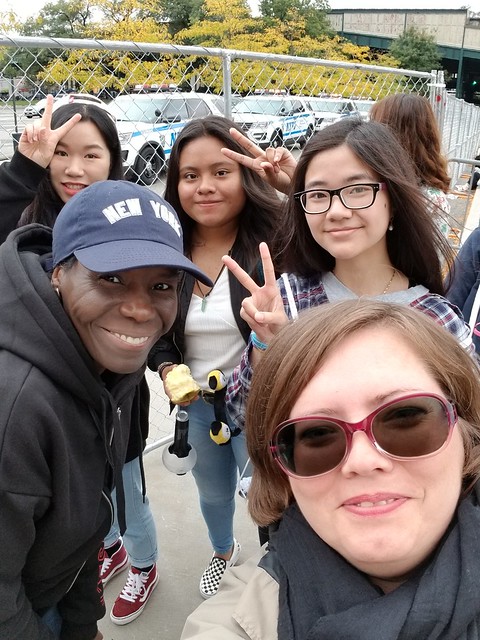
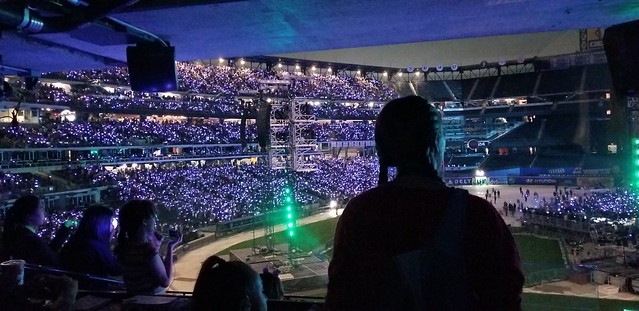
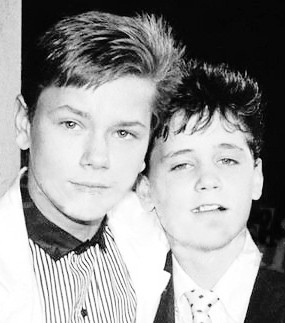
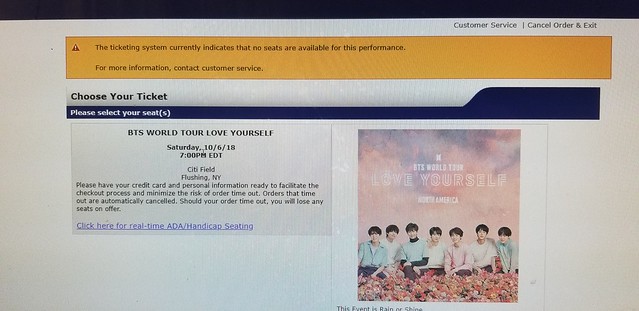
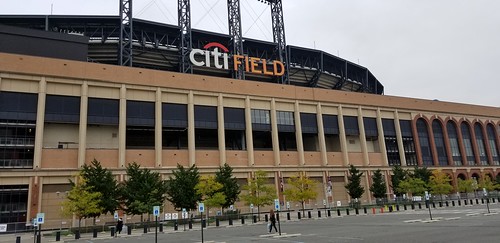
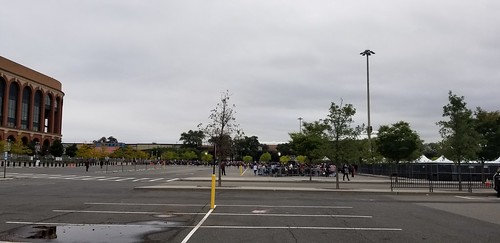
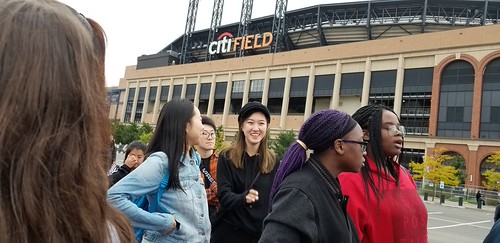
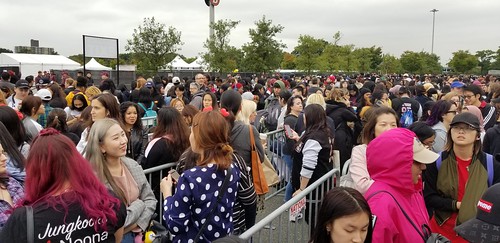
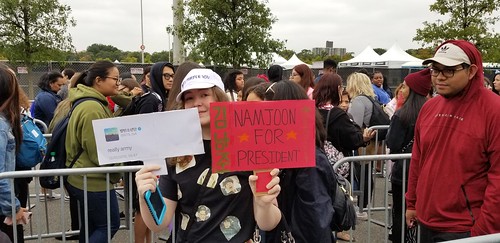
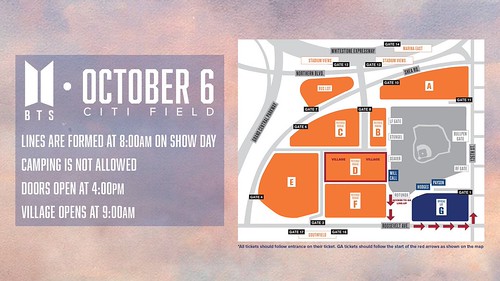

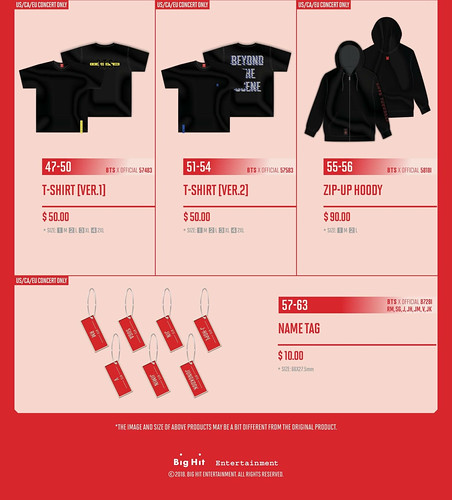
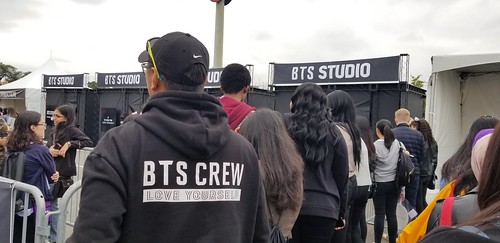
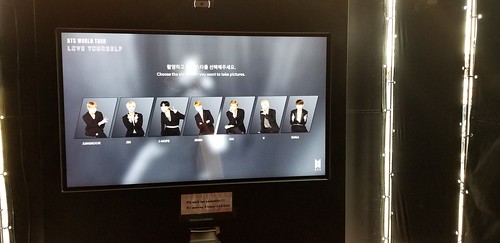
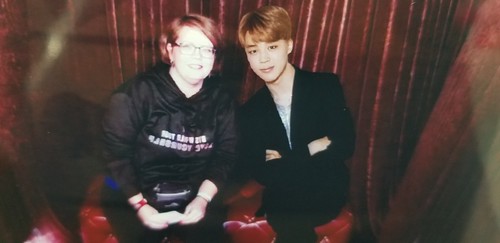
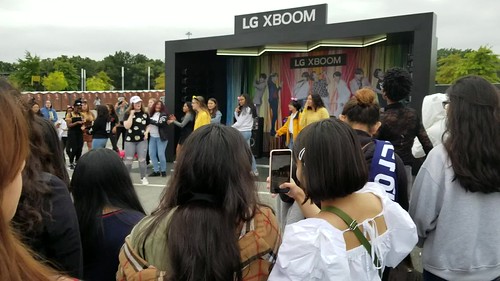
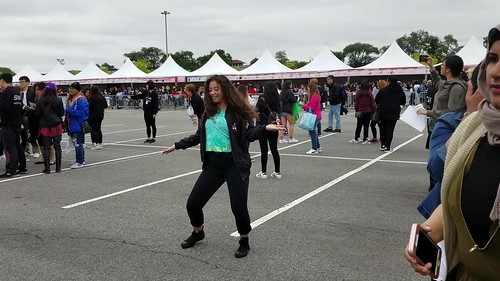
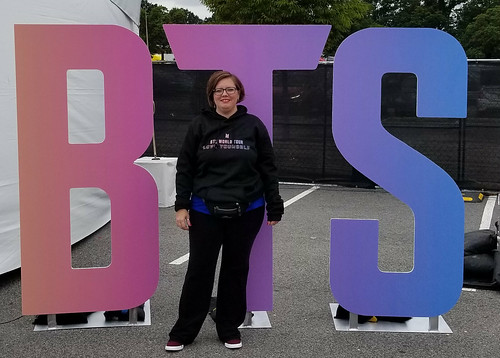
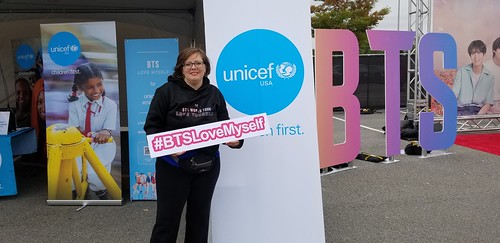

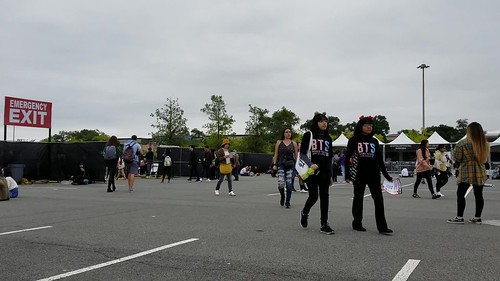
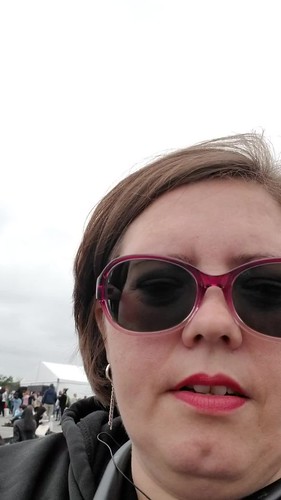
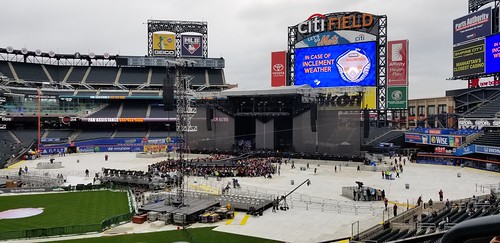
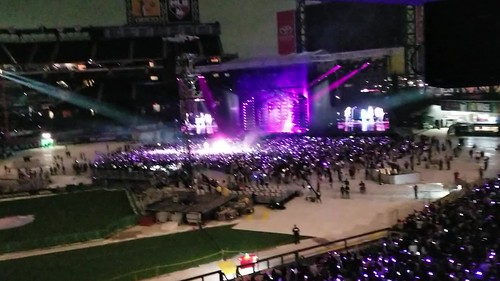

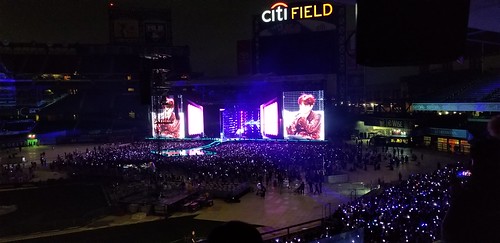

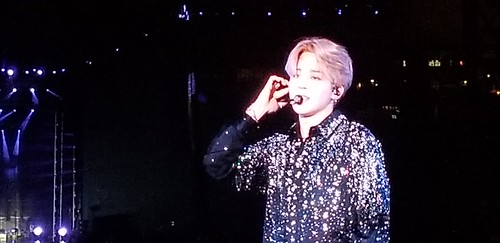
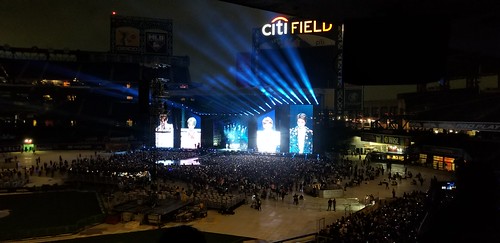
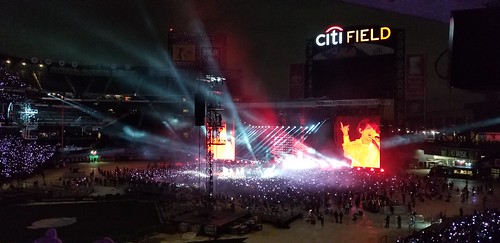


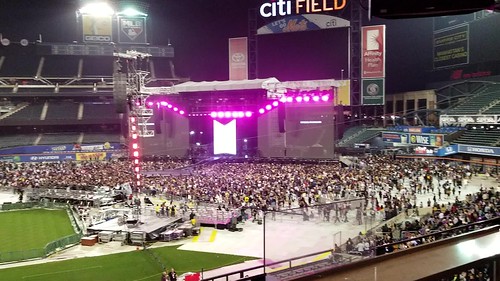

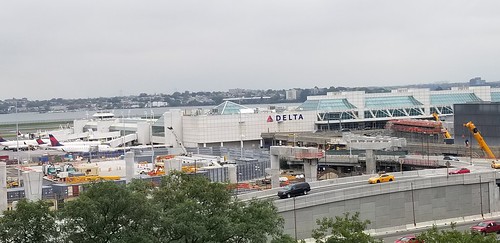
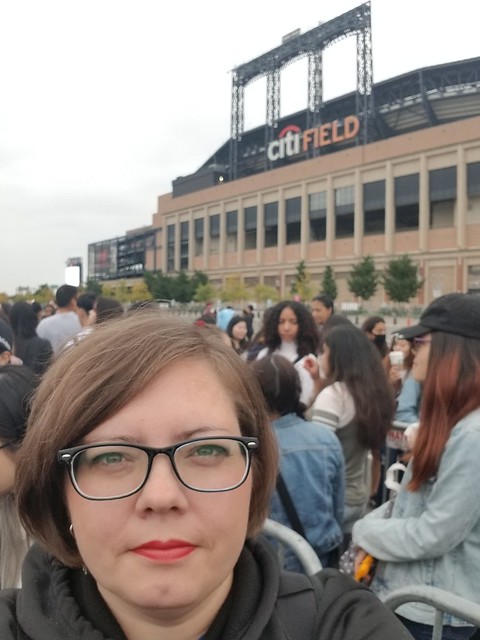




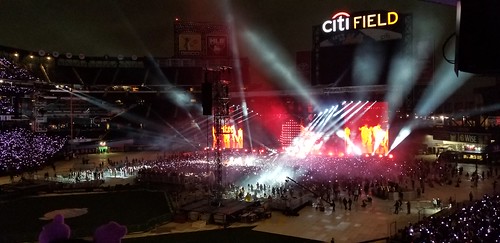




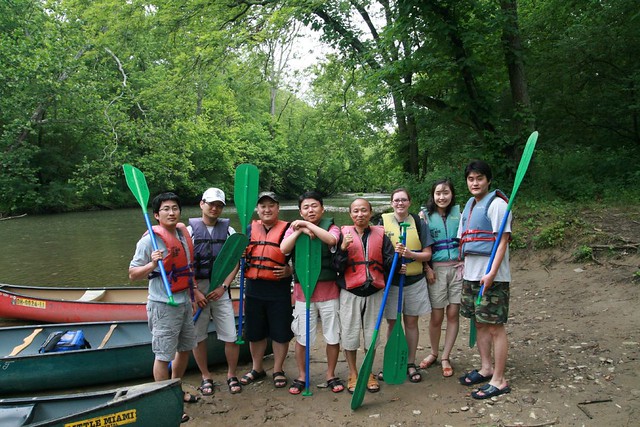
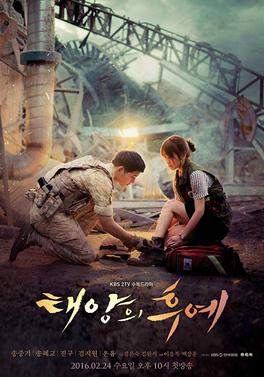




 irtual worlds, and not enough time thinking about how the rules of virtual worlds would be horrific if implemented in RL. Good point! From my quickly jotted notes as he was speaking:
irtual worlds, and not enough time thinking about how the rules of virtual worlds would be horrific if implemented in RL. Good point! From my quickly jotted notes as he was speaking:

 “I think of you as less of a person for using Second Life, and for no other reason.”
“I think of you as less of a person for using Second Life, and for no other reason.”